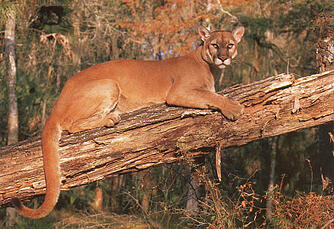 The weather has been cooling down and the days are getting shorter, meaning that the Florida panther will soon be coming out to play more often! These beautiful creatures, representatives of our great state, are among the best-known and least-seen animals of the Everglades. But just how much do you know about these big cats?
The weather has been cooling down and the days are getting shorter, meaning that the Florida panther will soon be coming out to play more often! These beautiful creatures, representatives of our great state, are among the best-known and least-seen animals of the Everglades. But just how much do you know about these big cats?
By now, you surely know that the Florida panther is a highly endangered species, with only about 80 or 100 present in the wild. But since this big cat is known for being a skilled hunter, what is it that’s hunting her? Human interference and environmental troubles are the biggest threats to the panther population in the Everglades. Each year, a number of Florida panthers are killed by cars and trucks along Alligator Alley as they attempt to cross the road. Additionally, many panthers die from mercury ingestion; they eat raccoons, which are known to have high mercury content from the aquatic system, showing the extremely delicate balance of the food chain in the Everglades.
A number of important conservation and rescue programs have been put in place to help protect the dwindling numbers of big cats in the Everglades. First of all, environmentalists are working to protect and secure key habitat regions, setting it aside from human interaction and monitoring the water and soil quality to make sure it is conducive to healthy panthers. Additionally, many scientists are working on breeding programs and looking into genetic research to determine if there is any way to strengthen the panthers’ genetic lines. The process is slow and painstaking, but there is hope for potential growth and improvement in the future.
While you may not be a biologist or an environmental scientist, there are a number of ways you can step up to help the panther population. First of all, you can take any educational opportunities available, and encourage your family and friends to become educated on the panthers’ issues. Proudly display bumper stickers and signage for panther conservation to help raise community awareness. Also, many groups hold frequent events for fundraising and awareness. Be sure to attend these whenever possible, and invite your friends to come along.
One of the best ways to learn about Florida panthers is to participate in Orlando eco tours, where you’ll get firsthand knowledge about the panthers’ environments and habits. Book your eco-tour with Wild Florida today by calling us at (866) 532-7167.
Share this post with your friends and encourage them to learn more about the Florida panther! Have you participated in any conservation events? Share your experiences with us in the comments.


